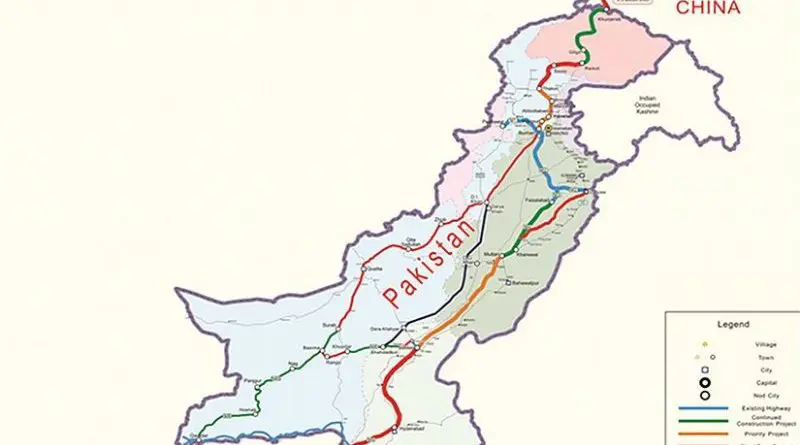Pakistan Will Stop At Nothing For CPEC – OpEd
By Asia Maqsood
Being part of the OBOR Strategy, CPEC is playing an inevitable role in China’s aim for economic expansion that will definitely benefit Pakistan’s economic situation.
CPEC depends upon Pakistan’s ability to sustain its political stability, internal security situation and provincial harmony and ability to curb extremism which is up to certain extent Pakistan have been successful. There are social, bilateral basis for CPEC which is multifaceted as on one hand it is important for China to cooperate through economics and trade according to liberal views.
It is pertinent o discuss here that it is an apprehension in some analysts’ views that China is capitalizing on vacuum in the bilateral relations of Pakistan and US for its economic and its strategic interests. I am differing here that Pakistan’s aspirations for the concrete relations with China is not against the US or at the cost of Pak-US relations, which have been strained since 2015 — instead both China and Pakistan have been trustworthy friends and diplomatic relations throughout their history.
This project will increase Pakistan’s regional connectivity prospects as well as for the economic growth by boosting the demands for domestic goods and services. Apart from this, there is optimism regarding this project that it could create peace and stability in the region, including Afghanistan. The operationalization of the Gwadar Port in 2016 is the obvious example of what CPEC is delivering on ground.
As China’s Foreign Minister Wang Yi said, “If One Belt One Road is like a symphony involving ad benefitting every country then the construction of China Pakistan Economic Corridor is a sweet melody of the symphony’s first movement”.
So if this is a sweet melody then all the stake holders of this mega project must take deep interest to secure this making peace in Baluchistan. On the progressive way of CPEC, the negative impulses are overtly coming from India towards proposed CPEC routes and the development of Gwadar Port because of two obvious reasons; first is that these planned routes passes through the conflicted territories of Gilgit-Baltistan and Kashmir among India China and Pakistan.
The second reason is that India has serious concerns that Gwadar will be a Chinese naval base. In response to this both China and Pakistan clarified that the port will be only used for economic purposes, but India still have fears of the Chinese navy access to Indian Ocean.
Last year India’s PM termed the corridor “unacceptable” for the same reason. As far as the security is concerned Andrew Small in his book “The China-Pakistan Axis” maintains that the biggest concern for the Chinese is growing terrorism in the region, especially in its most trusted ally Pakistan where Beijing has agreed to invest $46 billion (earlier cost) for CPEC. However, Islamabad has repeatedly raised its voice against India that it claims is fomenting attacks with just that goal in mind. In recent days Donald Trump has made harsh remarks on Pakistan, long accused of harboring terrorists, having drawn an accurate response from China and Russia, which are two emerging allies of Pakistan and have participated in various talks to resolve the Afghan crises.
“We have been paying Pakistan billions and billions of dollars, at the same time they are housing the same terrorists that we are fighting”, Trump said on a televised address on Monday 21 August 2017. Further he said that he is committed to leading the US to victory in America’s longest war in history and warned that Islamabad had “much to lose” by continuing to offer safe havens to agents of Chaos.
It is pertinent to discuss here that since 2001, the US has lost more than 2,200 troops in Afghanistan and in Trumps’ new strategy he will be deploying more 4,000 troops. As Pakistan, Moscow and Beijing since 2016, held a series of table talks to wipe out terrorism in the region.
According to an estimate of South Asia Terrorism Portal, there were 22,000 Pakistani civilians and 6,800 security personals that have been killed since 2003. It does matter in the unbiased analysis whether it had been acknowledged by US or not.
Looking at Pakistan’s diplomatic relations with Russia and China, Trump’s statement has some counter statements. Such as Chinese Foreign Ministry spokes person Hua Chunying appreciated Pakistan, its all-weather friend for making great sacrifices and important contributions in the fight against terrorism and called international community to fully recognize Islamabad’s efforts. And Russian Envoy to Afghanistan Zamir Kabulov speaking on Russia’s Afghanistan Daily that Pakistan is key regional player to negotiate with. He further said, “putting pressure on Pakistan may seriously destabilize the region-wide security situation and result in negative consequences for Afghanistan.
Summing up the whole discussion I would say that Pakistan and China will be accomplishing their mutual ventures particularly CPEC despite the many obstacles and hindrances put forward by India with the assistance of US. Pakistan will not be sandwiched between India’s and US’ stringent policies in the South Asia region because it has realized the unfruitful results in the long period of war on terror, at that time Pakistan has not another option except to be with the US. but now it is in better position in the whole geostrategic fulcrum of US.
*Asia Maqsood is Research Associate at Strategic Vision Institute Islamabad. she can be reached at [email protected]

